17. Recent Renewal, Pentecostalism / Charismatic Movement, Vatican II and Globalization
| Key Dates # |
|
|---|
| 1918 | Karl Barth's commentary The Epistle to the Romans; a counter to Liberalism
|
| Aleksandr Solzhenitsyn, Russian writer and critic of communism born (died 2008)
|
| 1918 | Billy Graham, Baptist minister and world evangelist, born
|
| 1934 | Founding of Wycliffe Bible Translators
|
| 1945 | Dietrich Bonheoffer, influential German pastor, writer, thinker, opponent of Nazi Government in Germany, executed in a concentration camp in Germany
|
| 1948 | World Council of Churches established; includes most Protestant denominations but not the Roman Catholic Church
|
| 1950 | The Lion, the Witch, and the Wardrobe, the first of The Chronicles of Narnia by CS Lewis
|
| 1951 | Richard Niebuhr's Christ and Culture challenges Christians living in a materialistic age
|
| 1955 | L'Abri Fellowship founded by Francis Schaeffer, American theologian, philosopher, author of numerous books on theology, philosophy, culture and the arts
|
| 1962-65 | Vatican II, sponsored by Pope John XXIII
|
| 1970s | Renewal in the Western church; the Jesus Revolution, as a counter to the Hippie
Movement; Charismatic Movement that spread Pentecostal expression to many
mainstream denominations in the West
|
| Revivals in churches through Latin America; parallel Marxist-inspired Liberation Theology, political instability, in the context of the Cold War
|
| 1972 | Death of Watchman Nee (Ni-To-sheng), Chinese Christian leader
|
| 1978 | Karol Józef Wojtyla elected pope, adopts the name John Paul II; leads traditional
renewal in the Catholic church; is influential in the collapse of communism in
Europe; although a traditionalist, he became the most travelled and popular
Pontiff in history; on fast-track to sainthood in 2014
|
| 1990 | Fall of Berlin Wall, collapse of the Soviet Union's domination of its satellites; new opportunities for church planting in those countries
|
| 1997 | Mother Teresa dies in Calcutta
|
Background
The 20thCentury ("Our Century") was arguably the most turbulent and sophisticated in history.
World population passed 7 billion. Two world wars, depression, the rise and fall (in most places)
of communism. Major scientific advances. Christian revivals in Latin America, Korea, China and
Africa. Development of mass communication like the Internet that turned the world into a
village. Mass evangelism. Decolonisation. The rise of Islam. Increased secularism of the West
(Christianity is no longer a Western religion, if it ever was). More Christians were martyred in
the 20thcentury than any other period of human history. The world Christian movement
experienced a re-emphasis on Pentecostalism; dealing with liberalism; expanding mission;
ecumenism; scholarship; and social justice. Politics in Europe and North America were co-opted
for a period by the so-called "religious Right", loose (but electorally influential) coalitions of
evangelical interests to the right of the political spectrum. By late in the 20thCentury terms
such as "post-modernism" and "post-Christian" were in vogue, as was the popularisation of
atheism (Richard Dawkins, Christopher Hitchens and others) but only part of the broader canvass
that also included record church growth in the developing world and new streams of Christianity
(such as the more formal home church movement and the "Emerging Church") and positive reevaluation
of Christian teaching (eg the popular Alpha course) in the West.
Some Key Developments
Pentecostalism and the Charismatic Movement
The 20thCentury witnessed remarkable church growth and renewal, especially in Pentecostal
movements. While church history confirms experiences of the baptism in the Holy Spirit and
speaking in tongues throughout the centuries, the late 19th / early 20th centuries saw an explosion
of Pentecostalism (so named because of similarities with signs of the coming of the Holy Spirit on
the Day of Pentecost, see Acts 2) and a subsequent "Charismatic Move" in mainstream churches
(so named because of emphases on "charismata" or the "Gifts" of the Spirit).
From the middle of the 19thCentury, a strand of personal holiness teaching emerged within
certain Protestant groups which taught that, after conversion, a second experience was possible
in which the Christian believer would be brought into a state of cleansing from sin as they
prepared themselves for a life in Christ. This, combined with Millennialism (addressing the
hopes and fears associated with the turning of the century with the Second Coming of Christ),
and a literal approach to scripture which promised spiritual gifts to believers, contributed to an
increased interest in healing and other divine manifestations of the Holy Spirit.
The Pentecostal presence and power of the Spirit were emphasized in the Welsh revival (1904-
05). Meetings were long, spontaneous, and seemingly chaotic and emotional. The immediacy of
God in the services and in personal experience was emphasized by singing in the Spirit,
simultaneous and loud prayer, and revelatory visions and prophecy. Revival leader Evan Roberts
(1878-1951) taught that a personal experience of Spirit baptism must precede any revival.
Although Pentecostalism's emphases were found in the radical and less common manifestations
of the Welsh revival, early Pentecostal leaders, especially in Britain, drew inspiration from the
revival and viewed their Movement as growing out of and continuing it.
A manifestation of spiritual power in a multiracial Christian outreach mission in Azusa St, Los
Angeles in 1906 is regarded by many as the birth of the modern Pentecostal movement. Initially
opposed by mainstream denominations, Pentecostal churches gradually increased in numbers
and influence around the world.
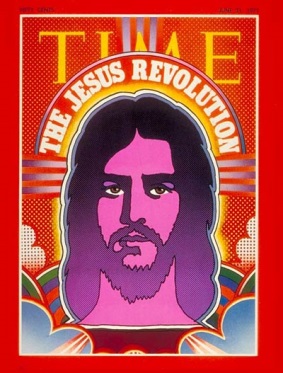
Time

One Way Symbol
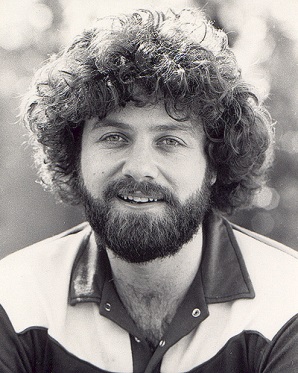
Keith Green
The 1960-70s witnessed the Jesus Movement. By 1971 revival movements had spilled over into
societies in the West, with thousands of young people gathering in halls and theatres to sing,
witness to others about their faith in Christ and repent, quitting drugs and immorality. The
pendulum had swung from the permissive hippie dropouts ("Make love, not war") of the sixties
(the "counter-culture") to a new wave of conversion in the seventies. Time magazine (21 June
1971) carried the above cover article on the Jesus People. Mass baptisms were held in the ocean
with outdoor meetings and teams witnessing on the beaches and in the city streets. New church
groups such as Calvary Chapel emerged, which did not fit traditional denominations. People
turned up to these churches in bare feet and old clothes as well as more traditional attire.
The period was marked by a new era in Christian music, led by Christian artists such as Barry
McGuire, Love Song, Second Chapter of Acts, Petra, Resurrection Band, Phil Keaggy, Dion
DiMucci, Randy Stonehill, Nancy Honeytree, Keith Green, and Larry Norman.
An important extension of the Pentecostal movement was the charismatic renewal, which saw a
new emphasis on the Holy Spirit's power and work in the believer take root in all major Christian
denominations. In Australia this commenced in the early 1970s. Most Christian denominations
now include charismatic renewal elements.
Pentecostal churches first appeared in Australia in 1909 and several denominations were
organised in the 1930s. However, unlike established churches, Pentecostalism has been
expanding rapidly since the 1970s. The oldest and largest Pentecostal body in Australia is the
Assemblies of God which embraces about 50% of Pentecostal groupings and is the main
movement in the umbrella Australian Christian Churches founded in 1997. Other important
churches are: The Church of the Foursquare Gospel; Apostolic Church; Christian Revival Crusade;
Full Gospel Churches, Christian Life churches; Christian Outreach Centres; Associated Christian
Assemblies; Christian City Church International; Australian Christian Fellowships; New Testament
Church of God; Potters House; Revival Centres, Vineyard Fellowships, and many independents.
Revivals in Latin America, Africa and Asia
C Peter Wagner's research describes Latin American Protestants growing from 50,000 in 1900 to
over 5 million in the 1950s, over 10 million in the 1960s, over 20 million in the 1970s, around 50
million by the end of the eighties and 137 million by 2000. Over 100 new churches begin every
week. Pentecostals are the biggest proportion of this growth. One quarter of the Protestants
were Pentecostal by the 1950s; three quarters by the 1980s. By then 90% of Protestants in Chile
were Pentecostal (Wagner 1986:27). Revival continues in Argentina, Chile, Brazil. I witnessed
some of this growth. Many congregations in Latin America now are huge, eg Jotabeche
Methodist Pentecostal Church of Santiago in Chile has over 90,000 members.
The church in Africa has grown from around 10 million in 1900 to over 200 million in the 1980s.
By 2000 that number passed 400 million, half the population. In the early 1900s one out of every
13,000 was a Christian; now one out of three is reported as being Christian.
Africa has seen many powerful revivals, such as the Belgian Congo outpouring with CT Studd in
1914. "The whole place was charged as if with an electric current. Men were falling, jumping,
laughing, crying, singing, confessing and some shaking terribly,' he reported. 'As I led in prayer
the Spirit came down in mighty power sweeping the congregation. My whole body trembled with
the power. We saw a marvellous sight, people literally filled and drunk with the Spirit.'
Between 1946 and 1949 the Belgian Congo experienced a further visitation of God. It followed
sustained prayer and fasting. Visions were common. Multitudes repented. Witch doctors burned
their charms and became Christians. Uganda, Nigeria and several other countries in Africa are
witnessing unprecedented church growth. Reinhard Bonnke (1940 - ), a German evangelist
called to Africa, has led mass crusades marked by the power of God in which thousands have
been converted, healed and delivered of evil spirits.
Seoul, capital city of South Korea, has more than 7,000 churches, including 10 of the 20 largest
congregations in the world. The spirit, fervour, and commitment of South Korean Christians to
spread the Gospel have moved them from being a missionary receiving country to a significant
missionary sending one. Korean missionaries now serve with various mission agencies around the
world; Koreans have sent over 10,000 missionaries into other Asian countries. David Yonggi Cho
led amazing growth at Yoido Full Gospel church of (at one stage) nearly a million members.
In 1950, missionaries expelled from China left behind an estimated one million evangelical
Christians, and three million Catholics. Many suffered and died in persecution during the early
decades of Communist government. Conservative figures today run from 75-100 million. This
growth is mostly attributable to underground revival spread through thousands of house
churches. Miracles, healings, visions and supernatural interventions of God have marked this
outpouring of the Spirit.
The above represents only a snapshot of church growth over the past half century, which has also
touched many other churches.
Televangelism
The growth of mass media in the post-war era produced a number of new forms of Christian
ministry, including the television evangelist. Evangelical Christians were among the first groups
to recognize and utilize the power of mass media, beginning with the early days of commercial
radio in the 1920s. Strictly defined, televangelists are ministers of the Christian gospel who
regularly conduct services or other programming on television. Through use of this medium,
claims of moral and spiritual authority, and skill at raising funds and influence, televangelists
made an undeniable impact on both the popular and political culture in the West. The new
environment shaped the development of televised evangelist ministries in the 1950s as Billy
Graham, Oral Roberts, and other early televangelists developed programs for syndication.
By the early 1980s, television evangelism had become a multimillion-dollar industry with a
worldwide audience of over 20 million viewers supporting a vast network of worldwide
ministries. The tide began to turn in the late 1980s. In January 1987 Oral Roberts, one of the
first and most successful televangelists, told his audience that he needed to raise $4.5 million in
three months or "God will call me home." In March of that year, Rev Jim Bakker of PTL ("Praise
the Lord") Ministries was accused of immorality and misappropriating funds. In 1988, allegations
surfaced that Jimmy Swaggart, the televangelist cousin of recording artists Jerry Lee Lewis and
Mickey Gilley, admitted to immorality and temporarily stepped down from his ministry. The
1990s saw a decline in the popularity of televangelists, prompting many broadcasters to turn to
family-oriented programming to boost audiences. Nevertheless, the core of televangelism with
its emphasis on sermons, salvation, and solicitation of funds, remains strong in parts of the
world.
Christian leaders today frequently use the full range of instant communication tools, including
Facebook and Twitter.
Vatican II
The 21st ecumenical council of the Roman Catholic Church; set up by Pope John XXIII. Vatican II
recognised the church's need to engage in the context of the modern world. Among the most
notable of the 16 documents enacted were the Dogmatic Constitution on the Church, which
deals with church hierarchy and provides for greater involvement of "laypeople" in the church;
the Dogmatic Constitution of Divine Revelation, which maintains an open attitude toward
scholarly study of the Bible; the Constitution on the Sacred Liturgy, which provides for the use of
vernacular languages in mass in place of Latin; and the Pastoral Constitution on the Church in
the World of Today, which acknowledges the profound changes humanity has experienced in the
modern world and attempts to relate the church to contemporary culture. Vatican II reflected a
major shift in the Roman Catholic Church and its impacts continues to be felt today.
Escalation of Missions and Bible Translation - "Let the Earth hear His Voice"

We have previously discussed modern missions, but developments in the past hundred years have
accelerated missions opportunities. These have included faster, cheaper and safer travel, Bible
translation (Wycliffe Bible Translators was founded in 1933), IT (Internet, Bible translation tools,
training tools for teaching Christians around the world and for skilling of indigenous Christian
leaders), better understanding of people groups, cross-cultural evangelism, indigenous
leadership, education (literacy), unprecedented availability of funds, a focus on "globalisation"
of the Gospel (the Lausanne Movement), Decade of Harvest, 10-40 Window), short-term
missions, tent-making, medical missions, and better links between evangelism and international
assistance. The 20thCentury also saw growth in evangelical activity on university campuses.
Post Modernism - "Absolute truth does not exist"
The so-called "modern" period is often taken to have commenced after the end of the Mediaeval
Period (c. 1500). Some historians prefer to date it around the end of the 18thcentury, starting
with the French Revolution that overthrew old orders. "Post Modernism" is a generic term that
is increasingly being applied to literature, art, philosophy, architecture, fiction, and cultural and
literary criticism, among others, in a way that separates it from "modern".
Postmodernism is largely disappointment with, a reaction to (and rejection of) belief in truth
and trust previously held in relation to scientific advancement, unprecedented wealth,
education, advancement, the notion of the world reaching some kind of Utopia, or at least
fitting into a design of sorts; progress was considered inevitable.. The Enlightenment and
modernity brought good, but its deconstruction of truth, celebration of Man and Deist rejection
of the "God who is there" blinded us to the reality of evil, the kind we subsequently witnessed
in world wars, gulags and the holocaust. Modernity brought arrogance and assumptions that
truth could be understood without God.
Postmodernism is highly sceptical of explanations that claim to be valid for all groups, cultures,
traditions, or races, and instead focuses on the relative truths of each person. In postmodern
understanding, interpretation is everything; reality only comes into being through our
interpretations of what the world means to us. Individualism is important. Postmodernism
relies on experience over abstract principles, assuming that the outcome of one's experience will
necessarily be fallible and relative, rather than certain and universal. This implies there are no
objective truths, no certainties. Postmodernists are cynics, but they have no anchors.
Postmodernism denies the existence of any ultimate principles, and it lacks the optimism of
there being a scientific, philosophical, or religious truth that will explain everything for
everybody. Postmodernism creates doubters, unbelievers. It offers no hope - how can it? While
protesting against the self-satisfaction and smugness of modernity over against the perceived
ignorance of previous ages "(We have grown up") it leads to a void.
Some Influential People During This Period
CS Lewis (1898-1963)
CS Lewis was an author, essayist and Christian apologist. He is best known for his children's
classic series The Chronicles of Narnia.
Clive Staples Lewis was born in Ireland to a Protestant family. After a variety of private tuition
and public schools he was offered a scholarship at University College, Oxford University, where
he excelled academically. In 1917, his university life was interrupted as he volunteered to join
the British army in the First World War. He was transferred to the Somme valley where he took
part in trench warfare. In the last months of the war, he was injured by a shell and was sent
home to recuperate from his injuries. On returning to Oxford, he completed his degrees before
taking up a post teaching English at the university. He was a prolific writer and formed a close
friendship with other Oxford fellows such as JRR Tolkien. Lewis encouraged Tolkien as he wrote
his epic Lord of the Rings.
As a teenager Lewis had lost his faith - turned off by boring church services and the problem of
evil in the world. However, after returning to Oxford in the post war period, he became
increasingly perplexed by the existence of God and Christianity. After many evening chats with
Christian friends (including Tolkien) he finally converted to belief in God (theism) in 1929 and
became a Christian in 1931. He later wrote he felt a reluctant and unwilling convert. In his
Surprised by Joy,/i> he wrote that he came into Christianity, "kicking, struggling, resentful, and
darting his eyes in every direction for a chance to escape."
Lewis subsequently became an influential apologist for Christianity through publications such as
the Screwtape Letters. He concentrated on a more universal form of Christianity, seeking to
avoid the sectarianism that was common in Northern Ireland. He rarely made specific reference
to a particular denomination, but sought to reinforce the underlying Christian values shared by
all Christian faiths. However, he always remained an Anglican; to the disappointment of Tolkien,
he never converted to Roman Catholicism. His Christian beliefs also influenced his more popular
works such as the Chronicles of Narnia. Though he also includes some ideas from Roman and
Celtic myths, there are underlying Christian notions of sacrifice and Christ like actions.
After his death, his books and influence continued to grow. He has been rated as one of the top
English writers of all time and his books have been translated into numerous languages.
Karl Barth (1886-1968)
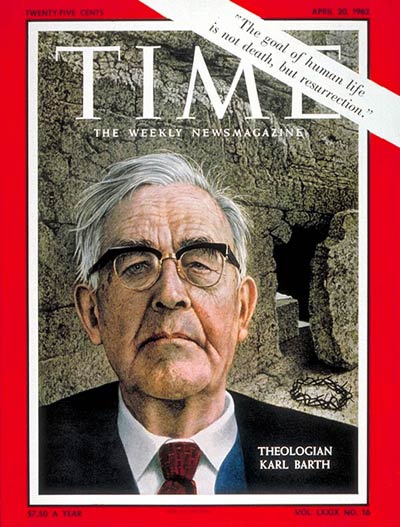
Barth was born in Basel, Switzerland and spent his early years growing up in Bern (his father
taught at the university). He began his studies in Bern in 1904 where he was introduced to Kant,
whose Critique of Practical Reason he called "the first book that really moved me as a student".
Barth went on to study at Berlin, a centre of Protestant liberalism, later studying at Tübingen
and finally in Marburg in 1908. While at Marburg, Wilhelm Herrmann had a great influence on
him. After Marburg, Barth spent ten years (1911-1921) as a pastor. This had a profound impact
on his theology as his "liberal assurances were initially undermined by exposure to the Swiss
social democratic movement". The outbreak of the Great War further disillusioned him... most
of his former teachers signed a declaration of support for the Kaiser. Barth described his
experience:
"An entire world of theological exegesis, ethics, dogmatics, and preaching, which up to
that point I had accepted as basically credible, was thereby shaken to the foundations,
and with it everything which flowed at that time from the pens of the German
theologians."
Barth returned to Scripture, especially studying the book of Romans, resulting in his
commentary, first published in 1919. Having grown up liberal he was now committed to the
Bible (the fall, original sin, atonement, justification, verbal inspiration of Scripture) and the
Reformers. Barth's commentary (which focussed on the sovereignty of God, His grace and
revelation, the sinfulness and limitations of man with God; man's need to respond to Christ)
resulted in a new-found prominence in Germany, which was recovering from the disaster of war.
As a result, he was offered a position as Honorary Professor of Reformed Theology in Göttingen,
from 1921 - 1925. He later held posts at Münster (1925-1930) and Bonn (1930-1935). After his
ejection from the Bonn faculty for resistance to the growing National Socialist (Nazi) movement,
he returned to Switzerland, where he taught until his retirement.
Barth is well known today for his Church Dogmatics (1932), his debate with Emil Brunner over
natural theology, the Barmen Declaration of 1934, and his travel to Rome in 1966 to talk with
those involved in the Second Vatican Council among many other things. Barth died on 10
December 1968.
Martin Lloyd-Jones (1899-1981)
British evangelical born and brought up within Welsh Calvinistic Methodism, he is most noted for
his pastorate and expository preaching career at Westminster Chapel in London. Lloyd-Jones
was converted in 1926, gave up a medical career and returned to Wales to preach and pastor his
first church in Sandfields, Aberavon. In 1939 he took up the role of pastor of Westminster
Chapel in London. The congregation grew quickly. From 1948 until 1968 when he retired, the
congregation averaged 1500 on Sunday mornings and 2000 on Sunday nights (large for the time).
In retirement, he worked as a pastor of pastors and itinerant speaker and evangelist. "The
Doctor", as he became known, was one of the major figures of British evangelicalism and his
books and sermons continue to be appreciated by many within the United Kingdom and beyond.
Dietrich Bonhoeffer (1906-1945)
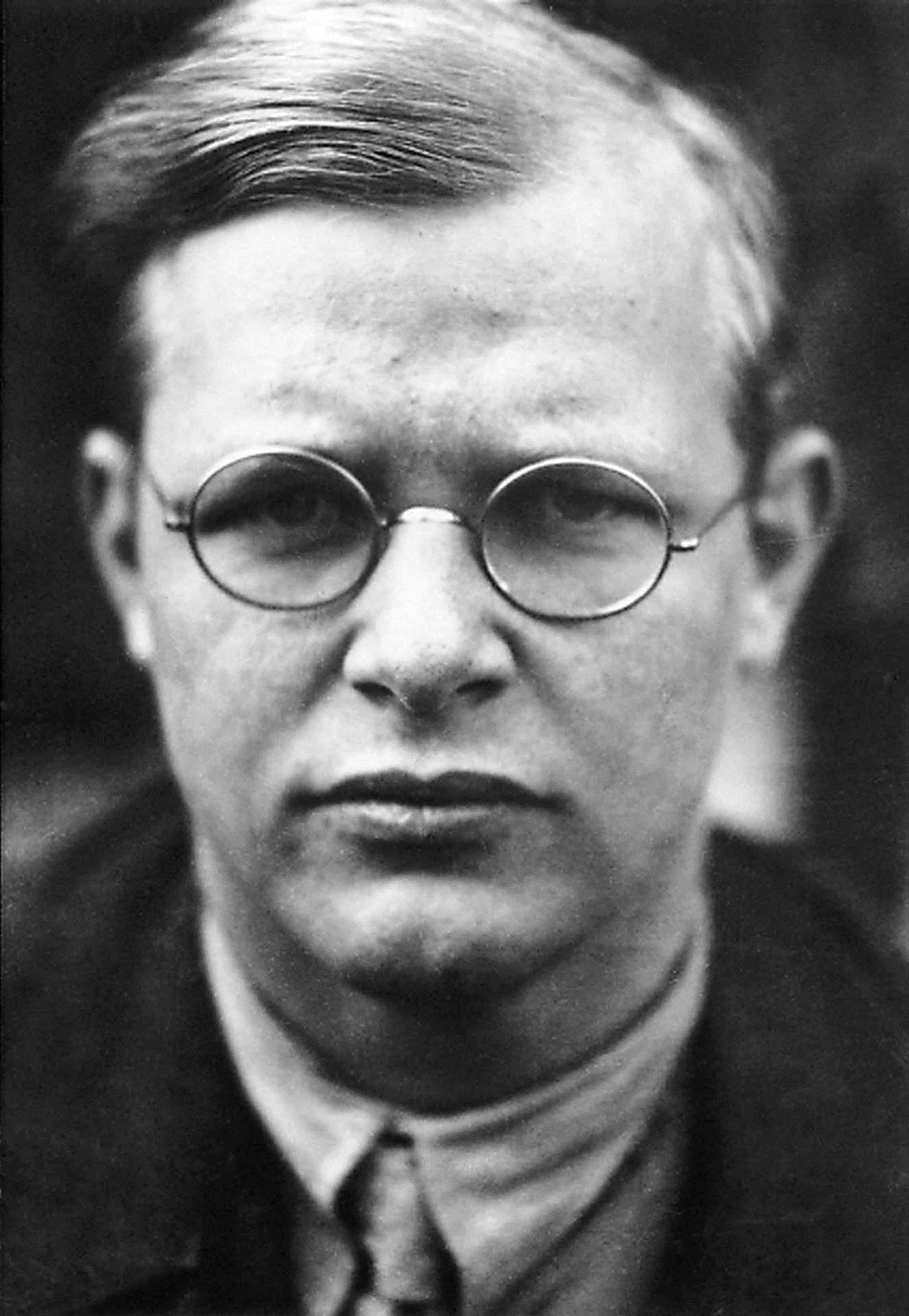
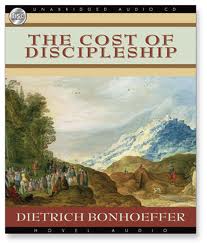
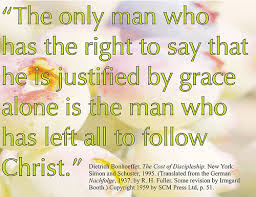
Bonhoeffer was born in 1906, son of a professor of psychiatry and neurology at the University of
Berlin. He was an outstanding student, and at the age of 25 became a lecturer in systematic
theology at the same University. When Hitler came to power in 1933, Bonhoeffer became a
leading spokesman for the Confessing Church, the centre of Protestant resistance to the Nazis.
He organized and for a time led the underground seminary of the Confessing Church. His book
Life Together describes the life of the Christian community in that seminary, and his book The
Cost of Discipleship attacks what he calls "cheap grace," meaning grace used as an excuse for
moral laxity. Bonhoeffer had been taught not to "resist the powers that be", but he came to
believe that to do so was sometimes the right choice (he had been officially forbidden to preach
or publish his works in Germany). In 1939 his brother-in-law introduced him to a group planning
the overthrow of Hitler, and he made contributions to their work. He was arrested in April 1943
after being accused of helping smuggle Jews out of Germany to safety in Switzerland and was
imprisoned in Berlin. After the failure of an attempt on Hitler's life in April 1944, he was sent to
Buchenwald, then to Schoenberg Prison. His life was spared, because he had a relative in the
government; but then this person was implicated in anti-Nazi plots. On 8 April 1945, he had just
finished conducting a service of worship at Schoenberg, when two soldiers came in, saying,
"Prisoner Bonhoeffer, make ready and come with us," the standard summons to a condemned
prisoner. As he left, he said to another prisoner, "This is the end - but for me, the beginning - of
life." He was hanged the next day, less than a week before the Allies reached the camp.
- "Being a Christian is less about cautiously avoiding sin than about courageously
and actively doing God's will."
- "When Christ calls a man, he bids him come and die."
- "Cheap grace is the grace we bestow on ourselves. Cheap grace is the preaching
of forgiveness without requiring repentance, baptism without church discipline,
Communion without confession.... Cheap grace is grace without discipleship,
grace without the cross, grace without Jesus Christ, living and incarnate."
- "Not hero worship, but intimacy with Christ."
Dietrich Bonhoeffer, The Cost of Discipleship
Billy Graham (1918- )
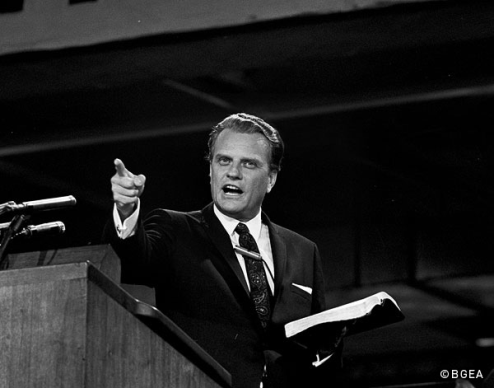
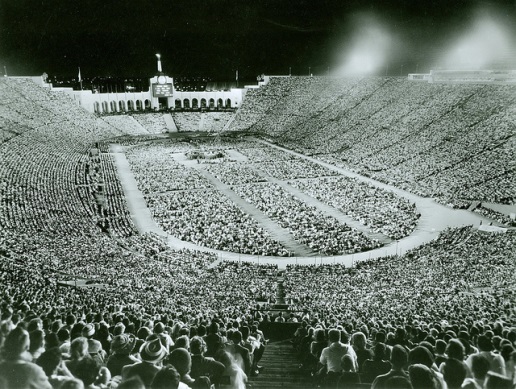
Billy Graham was born during the tumultuous context of World War and the great depression.
As a teenager, he experienced a radical conversion resulting from the preaching of evangelist
Mordecai Ham. As a student at Florida Bible Institute, he immersed himself in the Bible and
began to sense the call to give his life to preaching. He declared that 'My one purpose in life is
to help people find a personal relationship with God, which, I believe comes through knowing
Christ.' At 95, his life remains dedicated to this task.
After obtaining an undergraduate degree from Wheaton College he became a Pastor before
becoming an evangelist with Youth for Christ.
Billy Graham rose to prominence in a tent in Los Angeles, California in 1949. With little media
attention (but in the context of Western press promoting evangelism in the face of a growing
threat from communism), a series of evangelistic meetings was held that resulted in his
transformation from an unknown preacher to a household name synonymous with mass
evangelism, like DL Moody and Billy Sunday (the greatest evangelists of their times) before him.
The meetings were originally scheduled for three weeks but ended up running for eight as a
move of God resulted in many decisions for Christ. Public figures, sports stars and famous
businessmen were among those who committed their lives to following Christ.
Following on from Los Angeles, Billy Graham began to take his evangelistic message throughout
the world. He has preached to heads of state and indigenous groups around the world - a
greater audience than any other person in history. He has held meetings in Madison Square
Gardens in New York and in African deserts. In one mega-meeting in Seoul, Korea his audience
was calculated to be more than one million. Some estimates of people making public
commitments to Christ under his ministry range as high as 215 million people. Billy Graham and
his team always emphasised integration of new believers into discipling churches.
Billy Graham's life has held up under the unforgiving scrutiny of the media. His commitment to
live with integrity the message he preached is what marked him as embodying a Scripturecentred
life.
John Stott (1921-2011)
During nearly 70 years as an evangelical leader, English cleric John Stott shaped scholarship in
the fields of biblical interpretation and discipleship, authored over 50 books—his 1958 Basic
Christianity is now an evangelical staple—and hundreds of sermons. While rooted in the Church
of England and his home church of All Souls, Langham Place, his ministry extended to the global
church. In 1974 Stott founded Langham Partnership International to equip pastors and
missionaries and served as a principle author of the Lausanne Covenant, an evangelism
manifesto that continues to guide international missions efforts. His book "Issues Facing
Christians Today" is a popular guide for believers in a non-Christian world, bringing important
current issues under the lens of biblically informed thinking.
Pope John XXIII (1881-1963)
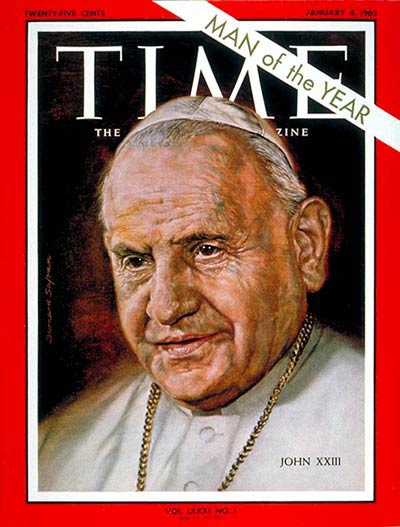
One of the most popular popes of all times (reigned 1958-63), who inaugurated a new era in the
history of the Roman Catholic Church by his openness to change, shown especially in his
convoking of the Second Vatican Council.
Elected Pope in 1958, he announced that he was summoning an ecumenical council - a meeting
of the bishops of the church - the first in almost a century. He said the idea came to him in a
sudden inspiration. His purpose was to "bring the church up to date" and work for its spiritual
regeneration. He was the first pope since the Reformation who acknowledged that Catholicism
stood in need of reform. John made it clear that the Second Vatican Council was convened as a
pastoral council. No new dogmas were to be pronounced, though old doctrines and disciplines
were to be re-examined. He sought a "New Pentecost," a new outpouring of the Holy Spirit.
The council, according to John's design, would make a new start toward achieving Christian
unity by putting aside the hostilities of the past and acknowledging the Church's share of
responsibility for the scandal of a divided Christianity. With long experiences among the Eastern
Orthodox, John's interest in Christian ecumenism seemed natural enough, but no one in Rome
was quite prepared for the extent of his openness. He received Eastern Orthodox, Anglican, and
Protestant religious leaders with extreme cordiality and made sure they were invited to send
observers to the Vatican Council. He removed certain words offensive to Jews from the official
liturgy of the church. Many who assessed his legacy believe that the church was never the same
again after his pontificate.
Mother Teresa (1910-1997)

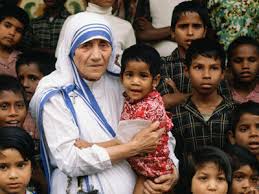
Mother Teresa was born Gonxha (Agnes) Bojaxhiu in Skopje (now Macedonia), to Albanian
parents. During her early years she was fascinated with stories of missionary life and service.
The first part of her Christian service (from 1928) was spent working with the Loreto Sisters of
Dublin, missionaries and educators founded in the 17th century to educate young girls.
In 1929, she was sent to Darjeeling, India. In 1931, she made her first vows as a nun, adopting
the name of Teresa. She was sent as a teacher to St Mary's, a high school for girls in Calcutta. It
was in the protected environment of this school for daughters of the wealthy that her "vocation"
developed. During the next two years, she pursued every avenue to follow what she believed
was the direction God was pointing her: to go into the streets of Calcutta. "I heard the call to
give up all and follow Christ into the slums to serve him among the poorest of the poor."
Teresa had to confront the Church's resistance to forming new religious communities, and
receive permission from the Archbishop of Calcutta to serve the poor this way, without the
safety and comfort of the convent. As for clothing, Teresa decided she would set aside the habit
she had worn during her years as a Loreto sister and wear the ordinary dress of an Indian
woman: a plain white sari and sandals. She first went to Patna to prepare for her work by taking
a nursing course. In 1948 she received permission from Pope Pius XII to leave her community and
live as an independent nun, in Calcutta; she rented a small hovel to begin her work.
Though she had no equipment, she made use of what was available - writing in the dirt. She
strove to make the children of the poor literate and teach them hygiene. She gradually began
visiting the poor and ill in their families crowded together in the surrounding squalid shacks.
Teresa found a never-ending stream of human needs in the poor she met, and was frequently
exhausted. Despite the weariness of her days, and times of doubt, she never neglected her
prayer life, finding it the source of support, strength and blessing for all her ministry.
Within a year, young women came to volunteer their services and became the core of her
Missionaries of Charity. Others gave food, clothing, buildings, medical supplies and money. As
support mushroomed, more services became possible for increasing numbers of suffering people.
From their birth in Calcutta, nourished by faith, compassion and commitment and the example
of Mother Teresa, the Missionaries of Charity have grown considerably. Volunteers continue to
come from all parts of the world, serving those in great need wherever they are found. Homes
for the dying, refuges for the care and teaching of orphans and abandoned children, treatment
centres and hospitals for those suffering from leprosy, centres and refuges for alcoholics, the
aged and street people—the list is endless; the poverty of Calcutta and cities like it is grinding
and often only Christians are able to offer hep to those in need.
Until her death in 1997, Mother Teresa continued her work among the poorest of the poor,
depending on God for all of her needs. Honours came her way (including the 1979 Nobel Peace
Prize), along with opportunities to influence those in power around the world; in her own eyes
she was "God's pencil—a tiny bit of pencil with which he writes what he likes."
Despite years of strenuous physical, emotional and spiritual work, with periods of doubt
interspersed with periods of great faith, Mother Teresa seemed unstoppable. Though frail and
bent, with numerous chronic ailments, she always returned to her work, to those who received
her compassionate care for more than 50 years.
- "Let us touch the dying, the poor, the lonely and the unwanted according to the graces
we have received and let us not be ashamed or slow to do the humble work."
- "Words which do not give the light of Christ increase the darkness."
Pope John Paul II (1920-2005)
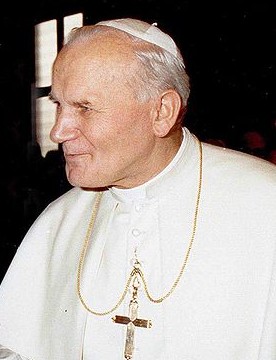
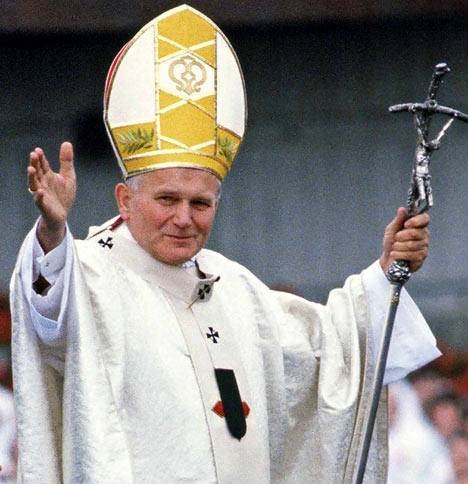
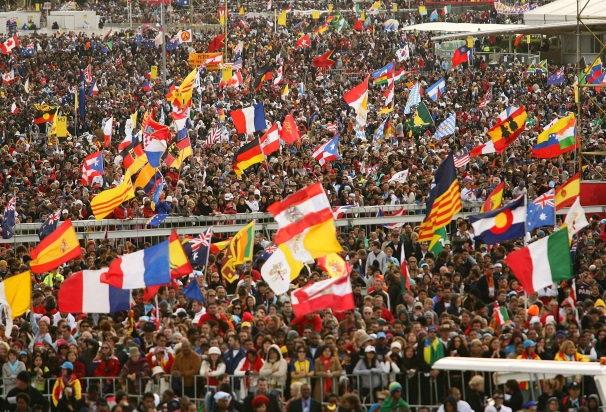
Karol Józef Wojtyla; successor of John Paul I. He was the first non-Italian pope elected since the
Dutch Adrian VI (1522-23) and the first Polish and Slavic pope.
Ordained a priest in 1946, he earned doctorates in philosophy (1948) and theology (1953), taught
ethics at Kraków and Lublin universities, and published works on theological and philosophical
topics as well as poetry and a play. He was consecrated a bishop in 1958, became archbishop of
Kraków in 1964, was a prominent spokesman for the Polish Church at the Second Vatican Council,
and was made a cardinal in 1967. He was elected Pope in 1978.
As pope, John Paul II was a traditionalist. He continued to implement the decisions of Vatican II
and placed special emphasis on devotion to Mary. He travelled widely, increasing the
international character of the papacy. In the first decade alone of his pontificate he visited 50
countries, in spite of the physical setback caused by being shot in St Peter's Square on 13 May
1981, by a Turkish gunman.
Despite increasing age and frailty, John Paul II continued to travel until nearly the end his life,
visiting 129 nations during 104 trips abroad. In 1999 he visited Romania and Georgia, becoming
the first pope to visit predominantly Orthodox countries; in 2000 he visited the Holy Land; in
2001 he retraced St Paul's missionary journeys in Greece, Syria, and Malta and visited Ukraine;
and in 2002 he visited Azerbaijan, Bulgaria, Canada, Guatemala, and Mexico. He also expanded
international representation in the College of Cardinals and Roman Curia.
John Paul pursued ecumenism (primarily with the Anglican Communion and Orthodox churches),
although he was unsuccessful in arranging a visit to Russia, and took various steps to improve
relations with Jews, including Vatican recognition of Israel and acknowledgment of Catholic
failures in responding to the Holocaust. Conservative on doctrine and issues relating to women,
he was also strongly critical of liberation theology and those who called themselves Catholics yet
continually questioned the church's teachings. In a 1995 encyclical he reasserted the church's
condemnation of abortion, euthanasia, and capital punishment. However, he also considered it
the church's responsibility to grapple with social questions and was an outspoken commentator
on world events. John Paul issued two encyclicals (1981, 1991) on economic issues in which he
praised free-market economies but criticized the inadequacies and injustices of both capitalism
and Communism. He expressed his opposition to the imposition (1981) of martial law in Poland
and used the resources of the church behind the scenes to support Solidarity prior to the
collapse of Communism in his native country; actions that also helped bring about the eventual
collapse of Communism generally in Eastern Europe and the Soviet Union. His 1998 encyclical,
Fides et Ratio, condemned both atheism and faith unsupported by reason and affirmed the place
of reason and philosophy in religion.
A charismatic, forceful, and multilingual man whose own faith was marked by deep piety and
mysticism, John Paul II humanized the papacy and managed to connect personally with the many
thousands that gathered whenever he visited a foreign land (especially young people; he
inaugurated World Youth Day in 1984). The days of his last illness, his lying in state, and his
funeral drew millions to Rome and Vatican City, where large, often emotionally demonstrative
crowds affirmed one last time how greatly he had altered the nature of the papacy and the
world's expectations of a pope. He was beatified in 2011 and will be canonised in April 2014.
Where Are We Today?
Think about Christians down through the ages > the Apostolic period > the early church fathers >
persecutions > toleration > the Middle Ages > the Reformation and Counter-Reformation > the
Great Awakening and the Enlightenment > the great Missions age > the turbulent 19th and 20th
centuries. They were people just like us. The struggles and challenges they faced were
different, but similar. It is our privilege to live in a modern, sophisticated world, although the
majority of Christians do not have the opportunities those in the West enjoy (and often take for
granted). We will be held accountable for what we have been given.
Christianity is now universal. We have been mandated to understand Biblical theology, how it
developed to what we understand today, how the global Christian movement inter-relates, and
to take our learning and skills to bless the world for Christ.
In some respects theology is more divided than ever before in the history of Christianity, with
tens of thousands of Christian movements/denominations, long histories, syncretism,
globalisation, complex social problems, new ethical challenges and racial, ethnic and political
divisions and interests. God never changes, but the people of God do. The Gospel demands that
our focus remain on Christ. Recent signs have been good; the new Pope, Francis I, has
emphasised a return to the Gospel; he is a good friend of evangelicals, including Luis Palau, an
Argentinian evangelist and member of the Billy Graham team for many years.
During this brief course we have only been able to touch briefly on highlights, themes and some
key individuals in every age. As a result, some major personalities and events have been
addressed with minimal detail, some not at all. Much more remains to be explored. Moreover,
it is critical that we "learn" so as to understand and apply. What we have seen is that issues,
challenges, controversies and lessons in theology that emerged repeatedly from the outset of
Christianity are still commonplace today. It is up to us to keep the spotlight on Biblical truth.
Christian theology will move forward as we go back 2000 years. As we embrace God the Father,
Christ His Son and our Saviour and the Holy Spirit as our empowerer and guide we will move into
the future with confidence and touch the world with the Gospel.
Additional Reading
Barth, K, The Epistle to the Romans, Church Dogmatics, The Christian Life, and others
Blainey, G, A Short History of Christianity, Viking, Melbourne, 2011
Bonhoeffer, D, The Cost of Discipleship, SCM Classics, London (2001 edition), and others
Graham, Billy, Peace with God, The Secret of Happiness, World Aflame, Just As I Am (autobiography), and many others
Lewis, CS - Surprised by Joy, Mere Christianity, The Chronicles of Narnia, and others
Lion, A Lion Handbook: The History of Christianity, 1990
McGavran, DA, Understanding Church Growth, Eerdmans, Grand Rapids, Michigan, 1970 (reprinted in 1992)
Miller, A, Miller's Church History: From the First to the Twentieth Century
Nee, Watchman, The Spiritual Man, The Normal Christian Life, Spiritual Authority, The Normal Christian Worker and many others, various editions
Renwick, AM, The Story of the Church, Intervarsity Press, Edinburgh, 1973
Wagner, C Peter, Look Out, the Pentecostals Are Coming, and others
Stott, J, Issues Facing Christians Today, The Radical Disciple, and others
Christians today have more teaching resources than ever before in human history; most are
concentrated in the West; the challenge before us is sharing those resources with the world
world-wide Christian community.















